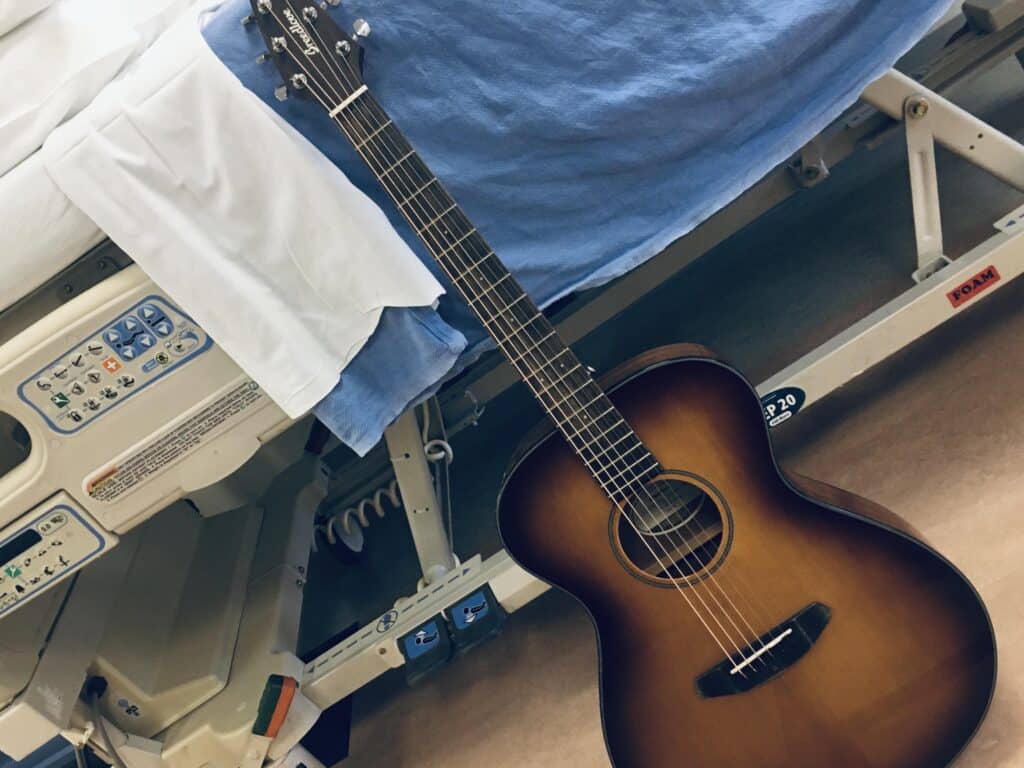Musical Therapy
“Music helps bring back a sense of self, which you immediately lose when you are admitted to a hospital or receive a diagnosis,” says Raymond Leone, MMT, MT-BC, a Board-Certified Music Therapist at Inova. Music therapists often support patients in intensive care and behavioral health settings. These highly trained clinicians work with fellow medical providers to deploy music in helping patients achieve their goals, but the service is not covered by insurance.
“This life-changing program is 100% funded through philanthropy—and it exists because people choose to give, ensuring that patients and families can access this support when they need it most,” says Jennifer Bires, Executive Director of Peterson Life with Cancer. “It’s incredibly moving to see our community come together to make this possible,”

“In addition to improving physical symptoms, music therapy addresses the psycho-social need of patients by treating the ‘whole person’,” says Leone, noting its positive impacts on mental health and overall well-being. “Music therapy is a body-mind-spirit experience.”
Sessions, tailored for individual patients, involve anything from listening to music and guided visualizations to structured songs, clinical improvisations, songwriting or music-assisted relaxation.
Leone recently was asked to visit a woman with a new cancer diagnosis who was being treated with chemotherapy. He recalls “just trying to be present” as she looked exhausted, pained, anxious. “I played some soundscape on the guitar…She closed her eyes. Then I moved into some songs, starting with ‘Stand By Me,’” he says. Her face softened, and Ray continued, noticing that she occasionally joined him in singing a few lyrics, and he closed with a “relaxed but uplifting” version of “I Can See Clearly Now.” She then opened her eyes and said, “These songs make me happy and sad at the same time. It’s just what I need.”
When patients with mental health issues struggle to express themselves verbally, music therapy offers self-expression in a safe, non-judgmental way, says Music Therapist Kalysta Bryant. “When words don’t work, music speaks,” says Kalysta, who understands firsthand the universality of music. “People engage in their own culture through music. They may be processing very complex trauma, and music therapy is very validating.”
A patient receiving treatment through Inova’s Behavioral Health services experienced intense mania, often struggling to regulate his emotions during group sessions. However, the safe space that music therapy provides ultimately allowed him to release intense emotions while building rapport with Inova team members and other patients. As his hospital stay came to an end, the patient said that he felt most seen and understood in music therapy.
Music therapy is a part of the Arts and Healing Program at Inova and is currently provided to patients undergoing treatment at Inova hospitals and facilities. Patients across Inova’s care sites are among its beneficiaries. Philanthropic gifts to the Arts and Healing Program are a vital part of Do. More. Together., Inova’s $500M fundraising campaign, dedicated to elevating the highest quality care for every patient we have the privilege to serve.